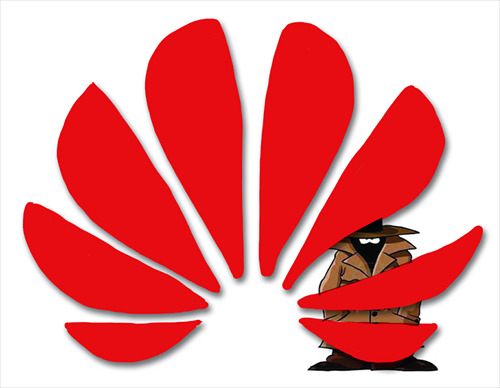HOME >> OP-ED
NSA's lawbreaking undercuts US image
By Charles Gray Source:Global Times Published: 2014-3-25 18:53:01

Illustration: Liu Rui/GT
The US has long positioned itself as a champion of international law and custom. Indeed, much of the US rationale for acting against nations such as Iran is that they are "rogue" governments, which refuse to adhere to internationally accepted norms of behavior.
However, US actions against the Chinese telecommunications giant Huawei show that the country is willing to violate the very norms it publicly champions in the service of national self-interest.
The US has long claimed that Huawei is closely associated with the Chinese government and conducts illegitimate intelligence gathering activities. However, it is the US, rather than China, that has violated the norms of international governmental and economic behavior in its attempts to hack into the networks of Huawei.
While espionage is an accepted part of international politics, this far exceeds what is normally seen as acceptable behavior. Much like the NSA's hacking of European communications, this event is likely to see the continued growth of widespread public distrust of US motives.
In economic terms, these revelations are likely to cost Huawei an unknown but substantial sum of money.
The company will have to take measures to render its infrastructure and products immune to future NSA activities. Software updates will have to be issued for products that are already on the market, increasing the costs of supporting already released product lines.
Less quantifiable will be the cost of the loss of consumer confidence in the security of Huawei's products. The NSA may have inadvertently helped protect the Chinese telecommunications company, in that Huawei's US competitors are seen to be heavily compromised by NSA surveillance activities. Nonetheless, any loss of confidence in Huawei's online and physical security is likely to see the loss of at least some business, especially on the part of businesses and nations that see themselves as potential US targets.
US politicians have long claimed that China poses an economic threat to US businesses. The NSA's claim that these activities are unmotivated by commercial concerns is thus doubtful. Even without the direct communication of proprietary trade secrets to US companies, the US government could take advantage of the NSA's inside information to benefit Huawei's competitors.
The NSA also hoped to use its penetration of Huawei to position it to exploit the secure networks of foreign nations and to give the US the capability to launch cyber war attacks against those networks, in order to suborn or cripple them if desired by the US government. Since it is unlikely that the NSA would announce their role in the attack, such an event could potentially see Huawei or even the Chinese government blamed for the attack.
The US has moved far beyond the traditional scope of what is seen as legitimate intelligence activities. Although the laws of war have not yet been updated to include questions of cyber war, launching attacks under another nation's flag has long been seen as illegal under both codified law and international custom. In such a case, Chinese nationals would face financial and possibly physical risk, especially if US involvement remained undetected.
Ultimately, while the US government continues to proclaim its interest in creating a regulated Internet where nations and companies alike will understand that there are certain norms of behavior, the actions of the NSA badly undercut that publicly stated goal.
The actions of US intelligence agencies, not simply in China, but also in Europe and the US itself, make it plain that US statements have little to do with the reality of US actions.
For the US, this disconnection may result in severe harm to its own financial and governmental interests.
Financially, it will become harder for companies to justify the risk of exposing themselves to US intelligence activities.
Governmentally, it is likely that the NSA's actions will see more defensive and offensive cyber war activities on the part of other governments and reluctance by world leaders and citizens to condemn activities that the US itself has helped to legitimize.
That escalation would lead to a less secure online world, forcing nations to make a choice between security and economic prosperity.
In fact, whatever their short-term benefits, the long-term consequences of the NSA's actions are likely to harm US interests quite as much as they do the interests of other nations.
The author is a freelance writer based in Corona, California. charlesgray109@gmail.com
Posted in: Viewpoint